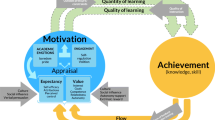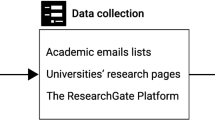Abstract
The competition for top positions in university rankings has put a stronger emphasis on the quality of university staff. Recruitment of excellent scholars is a core activity for university HRM. In this study, we compare the careers of pairs of similar researchers that were considered as very talented in their early careers. Of every pair, one has a continued academic career, whereas the other does not. We investigate to what extent success in academic career is determined by cultural, social and intellectual capital, and organisational and contextual factors.
Similar content being viewed by others
Notes
Germany consists of states, in German Bundesland.
This sample is not representative for all research careers, as we focus here on the top talents only.
http://cf.bc.uva.nl/download/instellingsplan_2007-2010.pdf; http://www.uu.nl/university/utrecht/nl/profielenmissie/hoofdlijnenstrategie/Pages/default.aspx; http://www.tue.nl/universiteit/over-de-universiteit/profiel-en-missie.
Next to these Dutch universities have the category ‘external doctoral students’, Ph.D. students not employed by the University. They generally work in other (public) research organisations, in educational jobs or in companies.
Ph.D. students are employed by the university, which in practice creates expectations that an academic career is the normal road.
High grades are defined as ‘cum laude’ or a comparable level.
That is first tenured position, promotion and departure.
For several reasons a straightforward performance match was not possible for all 21 pairs, for example, when the person that left did so in an early career phase when academic performance is still modest. For one third of the pairs, a performance comparison turned out to be possible.
In both cases, we had to clean the data in order to have the right persons included. Especially in PoP, we unified the publications that appeared in the list in different versions.
In a study comparing successful grant applicants with good rejected applicants, we also found that past performance did not differ between the two groups (van den Besselaar and Leydesdorff, 2009).
References
Anderson, E.M. and Shannon, A.L. (1988) ‘Toward a conceptualization of mentoring’, Journal of Teaching Education 39 (1): 38–42.
Auriol, L., Felix, B. and Schaaper, M. (2010) ‘Mapping careers and mobility of doctorate holders’, STI Working paper 2010/1, Paris: OECD.
AWT. (2005) Briefadvies inzake onderzoeksloopbanen, Den Haag: Adviesraad Wetenschaps-en Technologiebeleid, http://www.awt.nl/uploads/files/Briefadviezen/briefonderzoeksloopbanen.pdf.
Baker, M. (2008) ‘Ambition, confidence and entrepreneurial skills: Gendered patterns in academia’, http://www.tasa.org.au/.../Baker,%20Maureen,%20Session%2046%20PDF.pdf.
Baruch, Y. and Hall, D.T. (2004) ‘The academic career: A model for future careers in other sectors?’ Journal of Vocational Behavior 64 (2): 241–262.
Beekes, A. (1991) De hordenloop. Ontwikkelingen in de achterstand van vrouwelijke op mannelijke academici aan Nederlands universiteiten in de perionb 1960–1985, Utrecht: ISOR.
Bem, D. (1972) ‘Self-perception Theory’, in L. Berkowtiz (ed.) Advances in Experimental Social Psychology. Vol. 6, New York: Academic Press, pp. 1–62.
Bourdieu, P. (1988) Homo Academicus, Cambridge: Polity Press.
Broersen, S. (2003) Werken in de wetenschap: de loopbaanpositie van postdocs, Leiden: Research voor Beleid.
Burt, R.S. (1997) ‘The contingent value of social capital’, Administrative Science Quarterly 42 (2): 339–365.
Burt, R.S. (1998) ‘The gender of social capital’, Rationality and Society 10 (1): 5–46.
Cameron, S.W. and Blackburn, R.T. (1981) ‘Sponsorship and academic career success’, The Journal of Higher Education 52 (4): 369–377.
CBS. (2011) ‘Wetenschappelijk onderwijs: gepromoveerden aan universiteiten’, http://statline.cbs.nl/StatWeb/publication/?DM=SLNL&PA=71247ned&D1=0&D2=a&D3=a&D4=a&VW=T, accessed 20 June 2011.
de Grande, H., de Boyser, K. and van Rossem, R. (2010) ‘Carrièrepaden van doctoraathouders in Belgie: loopbaanpatronen naar wetenschapsgebied’, Ghent University.
de Pater, I. (2005) ‘Doing things right or doing the right thing. A new perspective on the gender gap in career success’, Ph.D. thesis, University of Amsterdam.
Deem, R., Mok, K.H. and Lucas, L. (2008) ‘Transforming higher education in whose image? Exploring the concept of the “world-class” university in Europe and Asia’, Higher Education Policy 21 (1): 83–97.
Ehrich, L.C., Hansford, B. and Tennent, L. (2004) ‘Formal mentoring programs in education and other professions: A review of the literature’, Educational Administration Quarterly 40 (4): 518–540.
Frost, P.J. and Taylor, M.S. (1996) Rhythms of Academic Life: Personal Accounts of Careers in Academia, Thousand Oaks: Sage Publications.
Gardiner, M., Tiggemann, M., Kearns, H. and Marshall, K. (2007) ‘Show me the money! An empirical analysis of mentoring outcomes for women in academia’, Higher Education Research and Development 26 (4): 452–442.
Hamovitch, W. and Morgenstern, R.D. (1977) ‘Children and the productivity of academic women’, Journal of Higher Education 48 (6): 633–645.
Hoffius, R. and Surachno, S. (2006) Tussen wens en werkelijkheid: carrièreperspectieven van jonge onderzoekers, Leiden: Research voor Beleid.
Huisman, J., de Weert, E. and Bartelse, J. (2002) ‘Academic careers from a European perspective: The declining desirability of the faculty position’, Journal of Higher Education 73 (1): 141–160.
Ivancheva, L. and Gourova, E. (2011) ‘Challenges for career and mobility of researchers in Europe’, Science and Public Policy 38 (3): 185–198.
Janasz, S.C. and Sullivan, S.E. (2004) ‘Multiple mentoring in academe: Developing the professorial network’, Journal of Vocational Behavior 64 (2): 263–283.
Keijzer, B.S.C. and Gordijn, E.H. (2000) Resultaten arbeidsmarktenquête jonge wetenschappers, Den Haag/Utrecht: NWO-ORP/LAIOO.
Labi, A. (2008) ‘Obsession with rankings goes global’, Chronicle of Higher Education, 17 October.
Lent, S.W., Brown, S.D. and Hackett, G. (1994) ‘Toward a unifying social cognitive theory of career and academic interest, choice, and performance’, Journal of Vocational Behavior 45 (1): 79–122.
Levin, H.M., Jeong, D.W. and Ou, D. (2006) ‘What is a world class university?’, http://www.tc.columbia.edu/centers/coce/pdf_files/c12.pdf.
Long, J.S. and McGinnis, R. (1993) ‘Rank advancement in academic careers: Sex differences and the effect of productivity’, American Sociological Review 58 (5): 703–722.
Mason, A. (2008) ‘Babies do matter in science’, Chronicle of Higher Education, 17 October, http://chronicle.com/jobs/news/2008/10/2008101701c.htm.
Mayer, A.P., Files, J.A., Ko, M. and Blair, J.E. (2008) ‘Academic advancement of women in medicine: Do socialized gender differences have a role in mentoring?’ Mayo Clinic Proceedings 83 (2): 204–207.
Mohrman, K., Ma, W. and Baker, D. (2008) ‘The research university in transition: The emerging global model’, Higher Education Policy 21 (1): 5–27.
Mok, K.H. and Chan, Y. (2008) ‘International benchmarking with the best universities: Policy and practice in mainland China and Taiwan’, Higher Education Policy 21 (4): 469–486.
Musselin, C. (2010) The Market for Academics, New York: Routledge.
Paglis, L.L., Green, S.G. and Bauer, T.N. (2006) ‘Does adviser mentoring add value? A longitudinal study of mentoring and doctoral student outcomes’, Research in Higher Education 47 (4): 451–476.
Probert, B. (2005) ‘I just couldn’t fit it in: Gender and unequal outcomes in academic careers’, Gender, Work and Organization 12 (1): 50–72.
Regets, M. (2007) ‘Brain circulation: The complex national effects of high-skilled migration’, http://www.oecd.org/dataoecd/59/57/38387715.pdf, last accessed 20 June 2011.
Rosenfeld, R.A. and Jones, J.O. (1987) ‘Patterns and effects of geographic mobility for academic men and women’, Journal of Higher Education 58 (5): 493–515.
Scaffidi, A.K. and Berman, J.E. (2011) ‘A positive postdoctoral experience is related to quality supervision and career mentoring, collaborations, networking and a nurturing research environment’, Higher Education 62 (6): 685–698.
Schwabe, M. (2011) ‘The career paths of doctorate graduates in Austria’, European Journal of Education 46 (1): 153–168.
Shin, J.C. and Cummings, W.K. (2010) ‘Multilevel analysis of academic publishing across disciplines: Research preference, collaboration, and time on research’, Scientometrics Online First, 6 May, doi 10.1007/s11192-010-0236-2.
Sonneveld, H., Yerkens, M. and van de Schoot, R. (2010) PhD Trajectories and Labour Market Mobility. Survey of Recent Doctoral Recipients at Four Universities in the Netherlands, Utrecht: IVLOS.
THE. (2012) ‘World reputation rankings 2012.
Thunnissen, M., Fruytier, B. and van den Brink, M. (2010) Beleid en beleving. Onderzoek naar jongetalentenbeleid op Nederlandse universiteiten, Nijmegen: Radboud Universiteit & Hogeschool Utrecht.
van Arensbergen, P. and van den Besselaar, P. (2012) ‘The selection of scientific talent in the allocation of research grants’, Higher Education Policy 25 (3): 405–406.
Van Balen, B. and Van den Besselaar, P. (2007) Universitaire onderzoeksloopbanen, Den Haag: Rathenau Instituut.
van den Besselaar, P. and Leydesdorff, L. (2009) ‘Past performance, peer review, and project selection: A case study in the social and behavioral sciences’, Research Evaluation 18 (4): 273–288.
van den Brink, M. (2009) ‘Behind the scenes of science. Gender practices in the recruitment and selection of professors in the Netherlands’, Ph.D. thesis, Radboud University Nijmegen.
van Doorne-Huiskes, J. (1979) ‘Vrouwen en beroepsparticipatie. Een onderzoek naar gehuwde vrouwelijke academici’, Ph.D. thesis, Utrecht University.
van Heek, F., Vercruysse, E.W., Veld-Langeveld, H.M., Kuiper, G., Van Braam, A. and Korstanje, B. (1958) Sociale stijging en daling in Nederland, deel I, Leiden: Stenfert Kroese.
van Vught, F. (2008) ‘Mission diversity and reputation in higher education’, Higher Education Policy 21 (2): 151–174.
Van Vucht Tijssen, B.E. (2000) Talent voor de toekomst, Toekomst voor Talent, Den Haag: Ministerie van OCW.
Wells, R.S., Seifert, T.A., Padgett, R.D., Park, S. and Umbach, P.D. (2011) ‘Why do more women want to earn a four-year degree? Exploring the effects of gender, social origin, and social capital on educational expectations’, Journal of Higher Education 82 (1): 1–32.
Wolfinger, N.H., Mason, M.A. and Gouldon, M. (2008) ‘Problems in the pipeline: Gender, marriage, and fertility in the ivory tower’, Journal of Higher Education 79 (4): 388–405.
Zuckerman, H. (1991) ‘The Careers of Men and Women Scientists’, in H. Zuckerman, J.R. Cole and J.T. Bruer (eds.) The Outer Circle. Women in the Scientific Community, New York: W.W.Norton, pp. 27–56.
Author information
Authors and Affiliations
Rights and permissions
About this article
Cite this article
van Balen, B., van Arensbergen, P., van der Weijden, I. et al. Determinants of Success in Academic Careers. High Educ Policy 25, 313–334 (2012). https://doi.org/10.1057/hep.2012.14
Published:
Issue Date:
DOI: https://doi.org/10.1057/hep.2012.14




